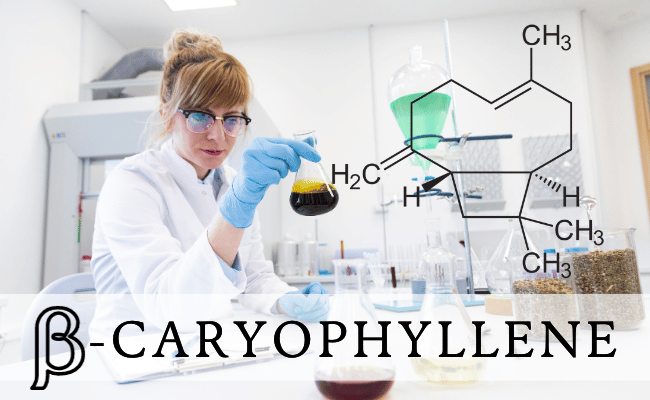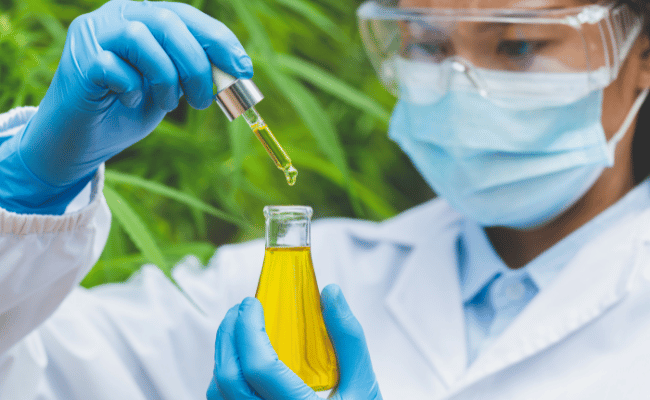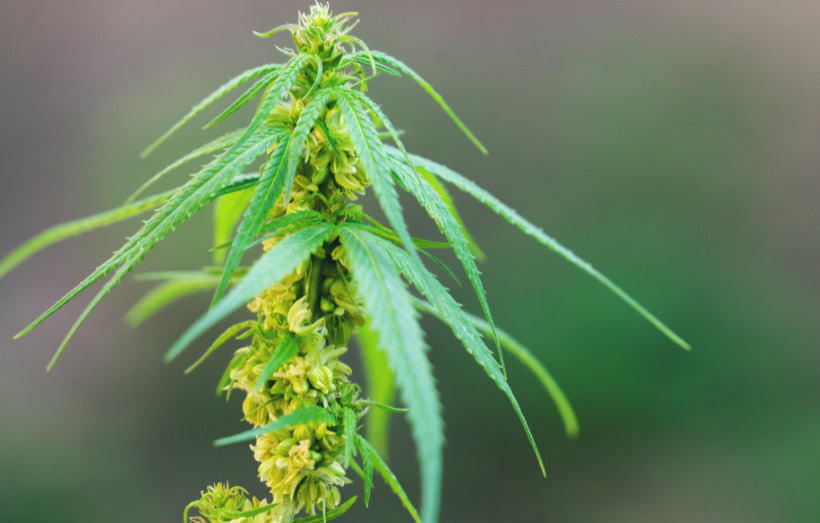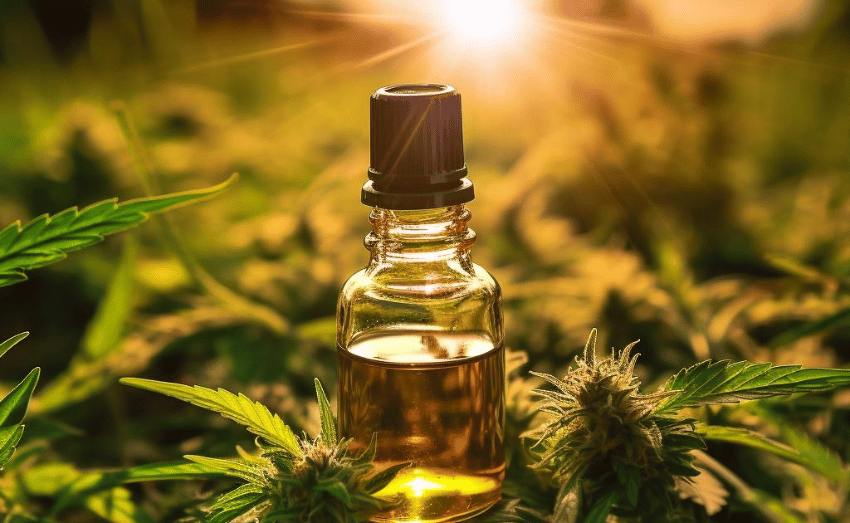In today’s wellness-focused world, many people explore various nutritional supplements, health elixirs, and dietary oils. Finding a versatile ingredient that promotes health and well-being can be challenging.
That’s where hemp oil comes in. Derived from plants and rich in essential fatty acids, hemp oil is gaining recognition in medical and nutritional fields.
Unlike its psychoactive counterpart, hemp oil is THC-free and backed by clinical studies and empirical data. Read on to learn more about the importance of essential fatty acids in hemp oil and why incorporating them into your health routine is worth considering.
What is Hemp Oil?
Hemp oil is an oil extracted from the seeds of the hemp plant, scientifically known as Cannabis sativa1. Fatty acids in hemp oil are a notable component of this extraction Unlike other extracts from the cannabis plant, hemp oil contains negligible amounts of THC, which is the psychoactive compound responsible for the “high” in marijuana.
Hemp oil is rich in nutrients, fatty acids, and bioactive compounds that have various health benefits.
Fatty Acids in Hemp Oil
Hemp seed oil is packed with special kinds of fats that are really good for you, including polyunsaturated fatty acids (PUFAs)2. These fats have important jobs in maintaining physiological well-being.
The following table elucidates the three primary types of these fats—Omega-3, Omega-6, and Omega-9—elaborating on their functional roles and intrinsic importance. It is advised to pay keen attention to this information.
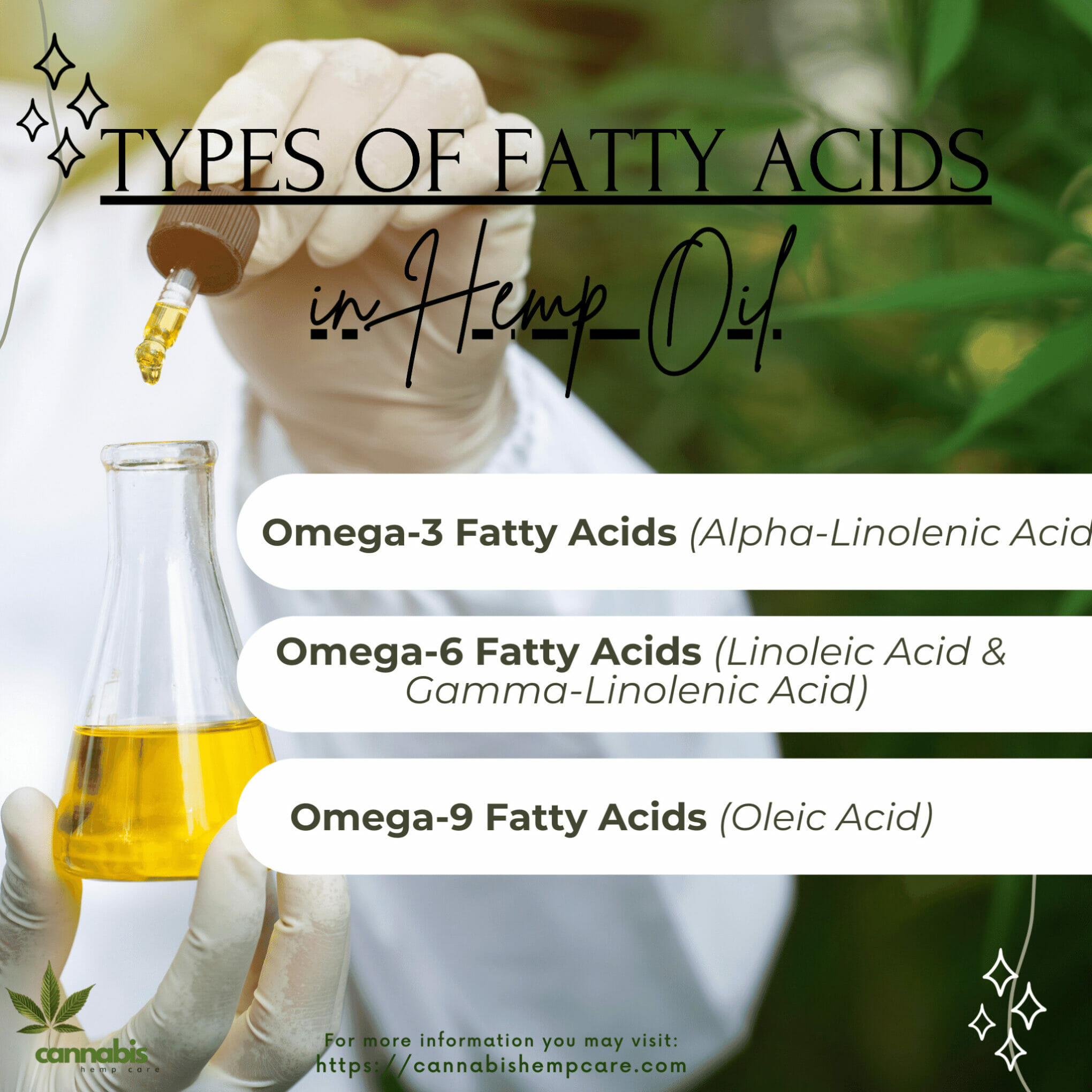
| Types of Fatty Acid in Hemp Seed Oil | Specifics | Benefits and Significance |
| Omega-3 Fatty Acids | Alpha-Linolenic Acid (ALA) – A vital Omega-3 fatty acid found in hemp seed oil. Your body can’t produce it, so you need to get it from your diet. | Omega-3s, including ALA, are excellent for heart health, reducing inflammation, and supporting brain health. |
| Omega-6 Fatty Acids | Linoleic Acid (LA) – Essential for skin & brain health Gamma-Linolenic Acid (GLA) – Beneficial for reproductive health | Omega-6 fatty acids like LA and GLA are crucial for skin health, inflammation reduction, brain function, and reproductive health. |
| Omega-9 Fatty Acids | Oleic Acid -Your body can produce this fatty acid, but (Oleic Acid) getting extra from your diet is beneficial. | Oleic acid is good for heart health, controlling cholesterol levels, boosting the immune system, and maintaining skin health. |
The 3:1 fatty acid ratio (omega-6 to omega-3) in hemp oil is particularly noteworthy. This ratio is considered optimal for human health, positioning hemp oil as a plant-derived source of omegas 3, 6, and 9.
Why Fatty Acids in Hemp Oil Are Important for Your Health?
Every cell in our body contains fatty acids, which are indispensable for brain function, skin health, and heart health. Their presence or absence can significantly impact overall health.
Fatty acids in hemp oil are exceptional because of their 3:1 fatty acid ratio, a balance lauded for potential health benefits.
The fatty acids in hemp oil are essential for cardiovascular health, inflammation regulation, and neurocognitive function. The 3:1 ratio of Omega-6 to Omega-3 in hemp oil is clinically optimal for human health.
Different Kinds of Fatty Acids
Not all fatty acids are the same, and they can be grouped into three main types:
- Saturated Fatty Acids: Present in hemp seed oil in minimal concentrations, these are found mainly in animal products and are best consumed judiciously.
- Monounsaturated Fatty Acids: These fatty acids are good for your heart and are also found in hemp seed oil. They are known to help balance cholesterol levels and support heart health.
- Polyunsaturated Fatty Acids (PUFA): With a high PUFA content, hemp seed oil primarily consists of omega-6 and omega-3 fatty acids. These fatty acids, vital for several physiological processes, are a cornerstone of hemp seed oil’s health benefits.
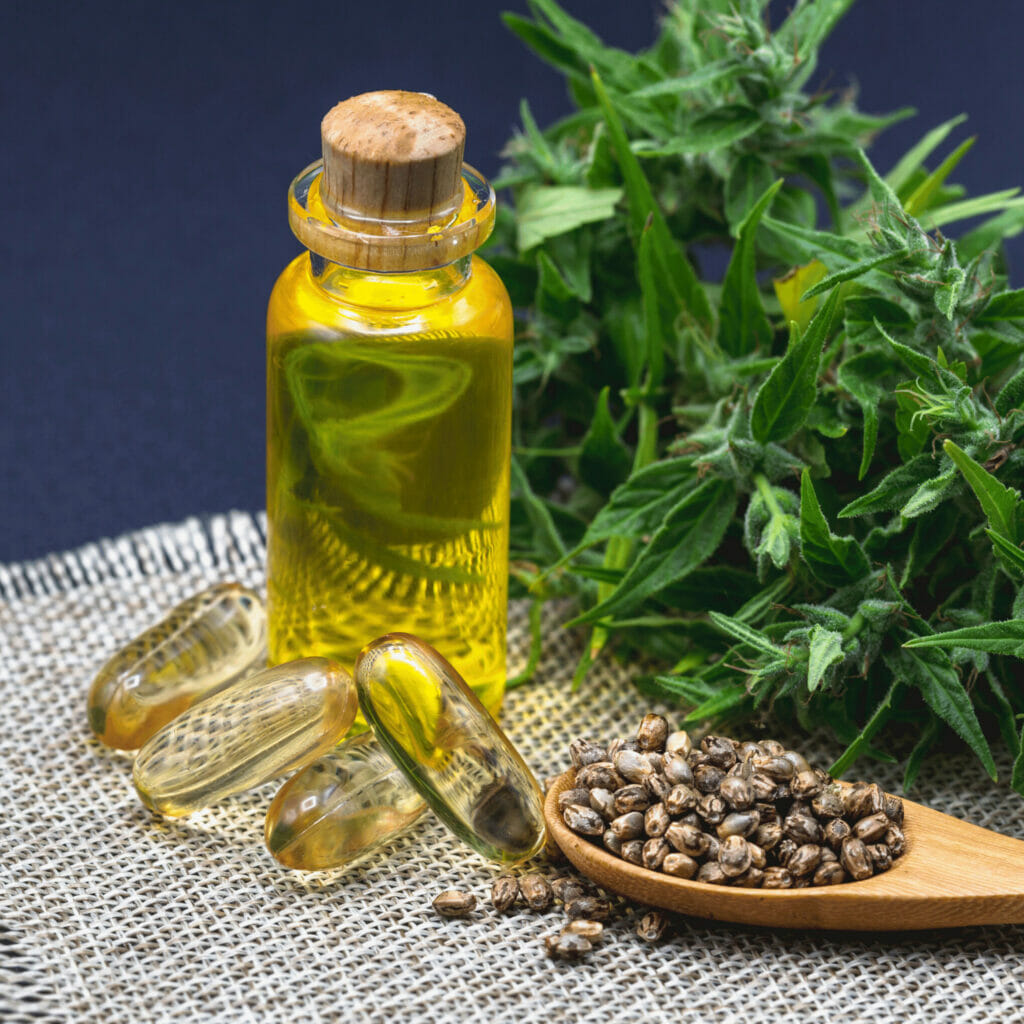
Health Benefits of Fatty Acids in Hemp Oil
In today’s fast-paced world, understanding the significance of hemp seed oil and its potential benefits can empower you to make informed choices for a healthier lifestyle.
Below are the key health benefits of hemp oil fatty acids.
| Cardiovascular Health | – Promotes Heart Health: Helps in maintaining regular heartbeat patterns. – Lower Blood Pressure: Essential for those at risk of hypertension. – Balanced Cholesterol: Reduces harmful LDL levels while raising beneficial HDL. |
| Anti-Inflammation | – Alleviates joint pain and symptoms of arthritis. – Eases skin irritations and conditions like eczema. – Reduces inflammation in the digestive tract. |
| Skin Health | – Moisturizes and nourishes the skin. – Helps control excess oil and reduce acne breakouts. – Calms irritated skin, aiding conditions like psoriasis. |
| Neuroprotection and Brain Health | – Enhances memory and cognitive function. – Protects the brain from inflammation. – May improve mood and reduce depression risk. |
| Supports a Healthy Pregnancy | – The essential fatty acids in hemp oil can be beneficial during pregnancy for brain and eye development in the fetus. |
While there are numerous benefits, it’s essential to consider potential health risks. The high PUFA content in hemp oil may not suit everyone. When oxidized, PUFAs can become harmful, so storing hemp oil in a cool, dark place and consuming it within its shelf life is imperative.
Potential Health Concerns
While the benefits of hemp oil are numerous, it’s essential to approach its use judiciously. Some individuals might experience:
- Lower Blood Pressure: An excessive intake might lead to a significant drop in blood pressure for those already on antihypertensive medications.
- Digestive Concerns: As with many oils, overconsumption can lead to digestive discomfort or loose stools.
Practical Applications and Consumption
Being a plant-derived source of omegas 3, 6, and 9, hemp oil is versatile. You can use as:
- Dietary Supplements: A convenient form to ensure daily intake of hemp oil’s nutrients.
- Cooking: Ideal for salads and dishes not requiring high heat, ensuring the preservation of its High PUFA content3.
- Topical Application: Direct application or as an ingredient in skin products can be highly beneficial.
Extraction Methods of Hemp Seed Oil
There are multiple methods of extracting oil from hemp seeds:
- Cold Pressing: The most common and least intrusive method. Seeds are pressed at a low temperature to extract the oil, which maintains most of the natural nutrients.
- Solvent Extraction: Although efficient, this technique, which uses solvents like ethanol, can leave residues.
- CO2 Extraction: Utilizing carbon dioxide under specific conditions, this advanced method ensures the purity and quality of the extracted oil.

Final Thoughts
Hemp oil’s fatty acids are like superchargers for your health. They help your heart, calm down inflammation, keep your skin happy, and even support your brain. Including hemp oil in your diet can be a simple but powerful step toward better health.
Remember, it’s all about balance. Enjoy hemp oil as part of your diet, but don’t overdo it. Like with many things, moderation is key. So, embrace the goodness of hemp oil, but make sure it fits well into your overall diet for the best results.
FAQs on Fatty Acids in Hemp Oil
What types of fatty acids are present in hemp oil?
Hemp oil predominantly contains polyunsaturated fatty acids (PUFAs), including Omega-3, Omega-6, and a smaller amount of Omega-9.
How do the fatty acids in hemp oil benefit cardiovascular health?
The fatty acids in hemp oil are linked to improved heart health through mechanisms such as lowering blood pressure, balancing cholesterol levels, and reducing inflammation.
Are the fatty acids in hemp oil good for the brain?
Yes, the Omega-3 and Omega-6 fatty acids in hemp oil support neurocognitive function, including memory and mood regulation.
Do fatty acids in hemp oil contribute to skin health?
Absolutely. The fatty acids in hemp oil help in skin hydration and can alleviate conditions like eczema and acne.
Is the Omega-3 in hemp oil the same as that in fish oil?
No, the primary Omega-3 fatty acid in hemp oil is alpha-linolenic acid (ALA), whereas fish oil mainly contains eicosapentaenoic acid (EPA) and docosahexaenoic acid (DHA).
How do the fatty acids in hemp oil differ from other oils?
What sets hemp oil apart is the unique 3:1 ratio of Omega-6 to Omega-3 fatty acids, which is considered optimal for human physiological processes and overall well-being.
Can I get enough fatty acids just by consuming hemp oil?
While hemp oil is a rich source of essential fatty acids, it should be part of a balanced diet to ensure you are meeting all nutritional needs.
Sources
- Ivanov, Sanjana Gupta, Zlatin. “Hemp Oil Is Packed with Healthy Fatty Acids — Here’s Why That’s Great News for Your Skin and Heart.” Insider, www.insider.com/guides/health/hemp-oil. Accessed 18 Sept. 2023. ↩︎
- Contributors, WebMD Editorial. “Health Benefits of Hemp Seed Oil.” WebMD, 18 Sept. 2023, www.webmd.com/diet/health-benefits-hemp-seed-oil#:~:text=The%20many%20health%20benefits%20of. Accessed 18 Sept. 2023. ↩︎
- “Hemp Seed Oil Properties – Oklahoma State University.” Extension.okstate.edu, 22 Oct. 2020, extension.okstate.edu/fact-sheets/hemp-seed-oil-properties.html#properties-of-hemp-seed-oil. Accessed 18 Sept. 2023. ↩︎

